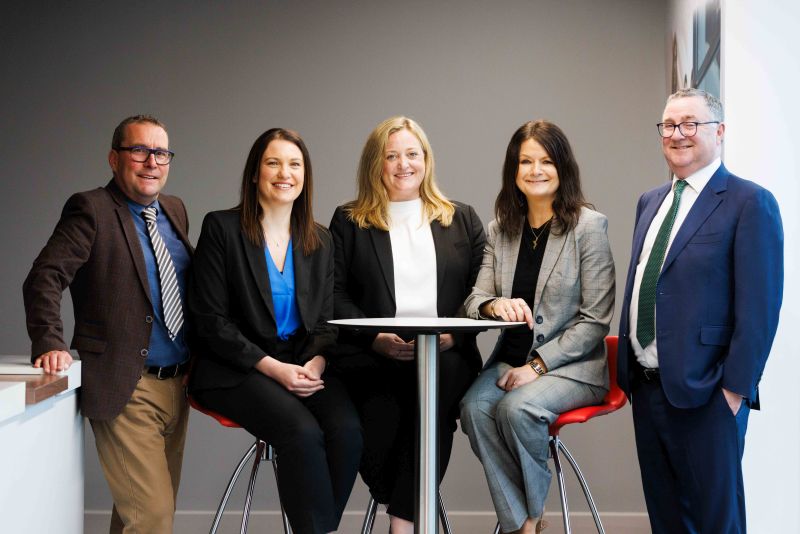
Workplace survey unfolds shift towards agile talent management, enhanced employee experiences, and the strategic integration of technology
Pictured at the HR Barometer 8.1 briefing in Shannon (from left): Peter Murphy, marketing and CSR, Ei Electronics; Michelle McDonagh, head of HR consulting and Sarah Fagan, managing director, Adare; Helen Downes, CEO, Shannon Chamber; and Tommy Cummins, head of industrial relations, Adare. Photograph by Eamon Ward
The findings of the latest workplace survey, undertaken by Shannon Chamber member company and leading experts in HR and Employment Law, Adare, were released to chamber members at a briefing in Shannon last week. The event was hosted in association with Ei Electronics.
The HR Barometer, now in its eight series, offers critical insights into the evolving landscape of human resource management in Ireland and has become a pivotal resource for companies striving to navigate the complexities of today’s workforce dynamics.
Key highlights from the survey, as they pertain to the Munster region, include:
Employee Engagement and Retention: Employee retention is a concern for businesses in Munster, with 63% of businesses identifying it as their top HR priority. Close behind is employee engagement, with 50% of businesses citing it as a concern, signalling a continued emphasis on maintaining a stable workforce amidst evolving labour market dynamics. Both areas have moved up the order of priority for companies since the last survey in 2023 when the figures stood at 39% (retention) and 48% (employee engagement).
Talent Development is also on the rise, climbing to the third spot in HR priorities, with 42% of employers in Munster increasingly focussed on enhancing employee productivity and effectiveness.
Turnover Rates and Forecast: The study reveals an employee turnover rate of 12% for 2023 and an expected turnover rate of 11.6% for 2024.
Motivations for Leaving: Remuneration remains a leading factor for employee turnover (63%), but this is closely followed by a need for career progression (50%) and geographic flexibility (45%). This indicates a broader trend of employees valuing professional development and work-life balance over financial incentives alone.
Cost of Turnover: The average cost of replacing an employee in 2024 is €10,600, up from €7,321 in 2022.
Absenteeism and Health: A notable rise in absenteeism rates to 6.9% in 2023 from 5.6% in 2022 pointed to mental ill health and work-related stress emerging as the leading causes of short-term absenteeism with 61% of companies noting increased absence rates due to these factors. This highlights the importance of supportive workplace practices. Employee Assistance Programmes (EAP) are widely implemented with 87% of respondents having one in place, while 74% of companies facilitate flexible working arrangements to ease pressures on employees.
Workplace Conflict and Dispute Resolution: Despite a reduction in formal disputes, 87% of companies in Munster have experienced a form of employee related issue or dispute, compared to 74% nationally, and up from the 2022 rate of 69%. The main causes of such disputes or employment issues were caused by ineffective line management (55%), lack of effective performance management (53%) and poor communication (42%).
Salary Trends: The survey indicates that 84% of employers in Munster plan salary increases in 2024, with an average anticipated raise of 3.5%.
Working Practices: Additionally, the landscape of working practices is shifting, with 46% of employees engaged in hybrid work arrangements, reflecting the ongoing adaptation to flexible working models.
Speaking at the Shannon event, managing director at Adare, Sarah Fagan said: “A critical insight from the survey is that growth isn’t just about profits, it’s about harnessing technology and innovative HR strategies to empower a workforce and thrive in a constantly evolving landscape.
“We are witnessing a profound shift towards agile talent management, enhanced employee experiences, and the strategic integration of technology, with organisations clearly focused on unleashing the potential of their people and thrive in the future of work. With very tight labour markets, companies are moving towards non-traditional career paths, upskilling their employees in areas that add value to their business.”
Congratulating Adare on the very valuable insights presented in HR Barometer 8.1, Shannon Chamber CEO Helen Downes said that the research reflects Adare’s commitment to empowering organisations with the knowledge and tools needed to navigate the ever-changing complexities of HR.
“These insights will be instrumental for businesses to develop robust and adaptable HR practices, not only tackling current hurdles but also unlocking future possibilities as they plan for the evolving world of work. Change is constant, and never more so than in the world of HR, particularly in a period of almost full employment.
“While the skills shortage will continue, by adopting dynamic approaches to HR, and using technological advances to create efficiencies and effectives within their businesses, companies can free up certain roles and upskill their employees in a career path that is non-traditional,” Ms Downes added, encouraging attendees to avail of the many training options available through the Chamber’s Skillnet business network.
Key statistics from the national data of the HR Barometer 8.1 highlights can be downloaded at www.adarehrm.ie/materials/hr-barometer-8-1-highlights-infographic-download/
